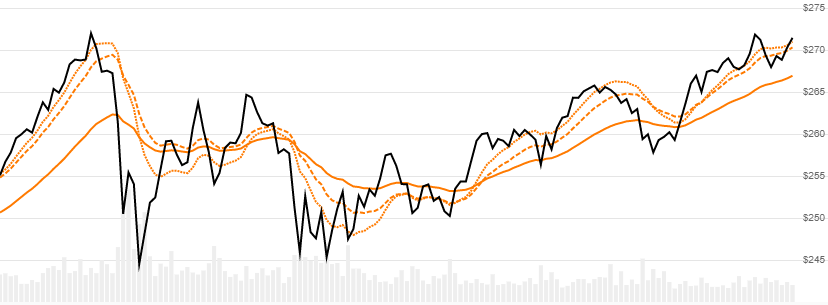Double Exponential Moving Average (DEMA)
get_dema(quotes, lookback_periods)
Parameters
| name | type | notes |
|---|---|---|
quotes | Iterable[Quote] | Iterable of the Quote class or its sub-class. • See here for usage with pandas.DataFrame |
lookback_periods | int | Number of periods (N) in the moving average. Must be greater than 0. |
Historical quotes requirements
You must have at least 3×N or 2×N+100 periods of quotes, whichever is more, to cover the convergence periods. Since this uses a smoothing technique, we recommend you use at least 2×N+250 data points prior to the intended usage date for better precision.
quotes is an Iterable[Quote] collection of historical price quotes. It should have a consistent frequency (day, hour, minute, etc). See the Guide for more information.
Return
DEMAResults[DEMAResult]
- This method returns a time series of all available indicator values for the
quotesprovided. DEMAResultsis just a list ofDEMAResult.- It always returns the same number of elements as there are in the historical quotes.
- It does not return a single incremental indicator value.
- The first
2×N-1periods will haveNonevalues since there’s not enough data to calculate.
⚞ Convergence warning: The first
2×N+100periods will have decreasing magnitude, convergence-related precision errors that can be as high as ~5% deviation in indicator values for earlier periods.
DEMAResult
| name | type | notes |
|---|---|---|
date | datetime | Date |
dema | float, Optional | Double exponential moving average |
Utilities
See Utilities and Helpers for more information.
Example
from stock_indicators import indicators
# This method is NOT a part of the library.
quotes = get_historical_quotes("SPY")
# calculate 20-period DEMA
results = indicators.get_dema(quotes, 20)
About Double Exponential Moving Average (DEMA)
Double exponential moving average of the Close price over a lookback window. [Discuss] 💬

See related EMA and Triple EMA.